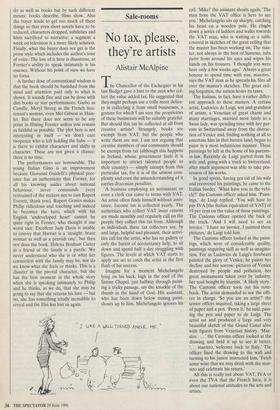Sale-rooms
No tax, please, they're artists
Alistair McAlpine
The Chancellor of the Exchequer in his last Budget gave a hint to the men who col- lect the value added tax. He suggested that they might perhaps use a trifle more delica- cy in collecting it from small businesses, a gesture for which I am sure the proprietors of these businesses will be suitably grateful. But should this tax be collected at all from creative artists? Strangely, books are exempt from VAT, but the people who write them are not. I am not arguing that creative members of our community should be exempt from tax (although this happens in Ireland, whose government feels it is important to attract talented people to their country) — simply exempt from this particular tax, for it is of the utmost com- plexity and even the misunderstanding of it carries draconian penalties.
A business employing an accountant or even a clerk can come to terms with VAT. An artist often finds himself without assis- tance. Income tax is collected yearly. The authorities who collect VAT insist returns are made monthly and regularly call on the people they collect this tax from. Although as individuals these tax collectors are, by and large, helpful and pleasant, their activi- ties call for the artist, who has no gallery or only the barest of accountancy help, to sit down and spend half a day struggling with figures. The levels at which VAT starts to apply are set to catch the artist in the first flush of his success.
Imagine for a moment Michelangelo lying on his back, high in the roof of the Sistine Chapel, just halfway through paint- ing a tricky passage, say the knuckle of the thumb in the hand of God. His assistant, who has been down below mixing paint, shouts up to him. Michelangelo ignores his call. 'Mike!' the assistant shouts again, 'The man from the VAT office is here to see you.' Michelangelo sits up sharply, catching his head on a wooden pole. He clinabs down a series of ladders and walks towards the VAT man, who is waiting at a table covered in sketches of the great ceiling that the master has been working on. The mas- ter, not always in the best of humour, rubs paint from around his eyes and wipes his hands on his trousers. 'I thought you were here only a few weeks ago.' Always a great honour to spend time with you, maestro,' says the VAT man as he spreads his files all over the master's sketches. The great ceil- ing forgotten, the nation levies its taxes.
The Italians, in fact, have a rather differ- ent approach to these matters. A certain artist, Ludovico de Luigi, son and grandson of artists, a Venetian of great charm and many marriages, married most lately to a Swiss lady, was spending time with her par- ents in Switzerland away from the distrac- tion of Venice and, finding nothing at all to entertain him in that barren land, began to paint in a most industrious manner. These paintings he left at the home of his parents- in-law. Recently de Luigi parted from his wife and, going with a truck to Switzerland, after much argument was able to take pos- session of his works.
In good spirits, having got rid of his wife and recovered his paintings, he came to the Italian border. 'What have you in the vehi- cle?' the Customs officer asked him. 'Paint- ings,' de Luigi replied. 'You will have to pay IVA [the Italian equivalent of VAT] of 19 per cent on the value of these paintings.' The Customs officer opened the back of the truck. 'And I will need to see an invoice.' I have no invoice, I painted these pictures,' de Luigi told him.
The Customs officer looked at the paint- ings, which were of considerable quality, paintings requiring skill as well as imagina- tion. For as Ludovico de Luigi's forebears painted the glory of Venice, he paints her decline and her sorrow: pictures of Venice destroyed by people and pollution, her great monuments taken over by industry, her soul bought by tourists. 'A likely story.' The Customs officer took out his note- book. The artist demanded to see the offi- cer in charge. `So you are an artist?' the senior officer inquired, taking a large sheet of paper and a pen. 'Prove it,' he said, pass- ing the pen and paper to de Luigi. The artist sat and produced a large and very beautiful sketch of the Grand Canal alive with figures from Venetian history. 'Mae- stro . . . ' the Customs officer looked at the drawing and held it up to see it better, . . maestro, welcome back to Italy.' The officer fixed the drawing to the wall and turning to his junior instructed him, 'Fetch some wine that we may drink with the mae- stro and celebrate his return.'
All this is really not about VAT, IVA or even the TVA that the French have, it is about our national attitudes to the arts and artists.


















































 Previous page
Previous page